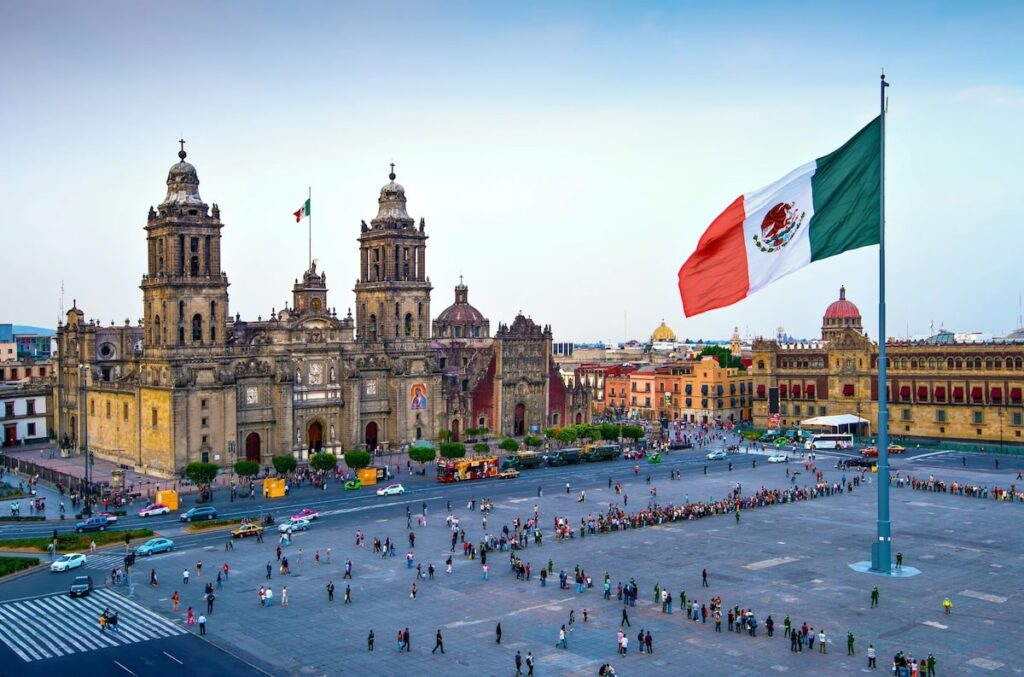Digital Nomad Visas & Remote Work Countries
It's time to go where you feel more alive and treated best!
0 M
Digital Nomads
0 +
Countries
Browse all the available digital nomad visas around the world to find out which fits you best.
Explore Destinations & Requirements
Remote work visas have revolutionized the way individuals live and work by allowing them to reside in a foreign country as full-time residents while working remotely. These visas, typically lasting around a year and often extendable, provide the flexibility to explore diverse cultures, landscapes, and lifestyles while maintaining professional commitments.
💰 €2,600+/month
⏰ 1 year, renewable ∞
💸 Tax: 15-23%

Greece
💰 €3,500+/month
⏰ 1 year, renewable ∞
💸 50% tax break

Germany
Not a nomad visa, but there are two different types of German visas that digital nomads can apply for.

Netherlands
Not a digital nomad visa, but there is a MVV Visa program for self-employed individuals.

Estonia
💰 €3,500+/month
⏰ 12 months
💸 Tax: 20%

Georgia
💰 $2,000+/month
⏰ 365 days
💸 Tax: 1%

Belgium
Not a digital nomad visa, but there is a Professional Card, aka the Freelance Visa or D-Visa.

Dubai (UAE)
💰 $5,000+/month
⏰ 1 year, renewable ∞
💸 Tax: 0%

Mexico
💰 $2,600+/month
⏰ Up to 4 years
💸 Tax: 0%

Czech Republic
💰 $2,700+/month
⏰ 1 year, renewable ∞
💸 Tax: 15%+(7%)

Iceland
💰 $7,800+/month
⏰ 180 days, non renewable
💸 Tax: 0%

Cyprus
💰 €3,500+/month
⏰ Up to 3 years
💸 Tax: 12.5% corporate

New Zealand
Not a digital nomad visa, but the Working Holiday Visa allows you to live and work up to 36 month.

Panama
💰 $36,000+/year
⏰ 9+9 months
💸 Tax: 0%

Montenegro
💰 €1,350+/month
⏰ Up to 2 years
💸 Tax: 9-15%

Bali & Indonesia
💰 $130,000+ bank deposit
⏰ Up to 10 years
💸 Tax: 0%

Slovenia
Not a digital nomad visa, but there is a Self-Employment Visa with a business registration.

Brazil
💰 $1,500+/month
⏰ 1 year, renewable
💸 Tax: 7-27%

Austria
Not a digital nomad visa, but there is Schengen tourist visa and visa options for startup founders.

Costa Rica
💰 $3,000+/month
⏰ Up to 2 years
💸 Tax: 0%

Norway
💰 €35,719+/year
⏰ Up to 2 years
💸 Tax: 22%

Sweden
Not a digital nomad visa, but there is a Self-Employment Visa with a business registration.

Chile
Not a digital nomad visa, but the Temporary Resident Visa is good enough for remote work.

Hungary
💰 €3,000+/month
⏰ Up to 2 years
💸 Tax: 15%

Romania
💰 €3,700+/month
⏰ 1 year, renewable ∞
💸 Tax: 10%

Taiwan
💰 $5,700+/month
⏰ Up to 3 years
💸 Tax: 18%

Malaysia
💰 $24,000+/year
⏰ Up to 2 years
💸 Tax: 0%

United Kingdom
Not a digital nomad visa, but the Standard Visitor Visa is valid for a remote work lifestyle in UK.

Vietnam
Not a digital nomad visa, but the eVisa (tourist visa) is an option for a temporal stay with remote work.

Argentina
💰 $2,500+/month
⏰ 180+180 days
💸 Tax: 5-35%

Malta
💰 €3,500+/month
⏰ Up to 4 years
💸 Tax: 10% (0% 1st year)

Singapore
Not a digital nomad visa, but there are multiple visa options that allow remote work within the country.

Philippines
💰 $24,000+/year
⏰ Up to 2 years
💸 Tax: 0%

Thailand
💰 $80,000+/year
⏰ Up to 10 years
💸 Tax: 0-17%

Serbia
💰 $3,500+/month
⏰ Up to 1 year
💸 Tax: 10%

Belize
💰 $75,000+/year
⏰ Up to 1 year
💸 Tax: 0%

United States
Not a digital nomad visa, but the B-2 Visa tourist visa allows no-US to live and work remotely.

Switzerland
Not a digital nomad visa, but the Entrepreneur visa and the Golden visa are available as alternative.

Peru
Waiting for updates from the Peruvian government regarding the new digital nomad visa.

India
Not a digital nomad visa, but the eVisa (1-5 years tourist visa) allows remote work within India.

Japan
💰 $68,000+/year
⏰ Up to 6 months
💸 Tax: N/A

Australia
Not a digital nomad visa, but the Visitor Visa allows you to stay up to 12 months.

Ireland
Not a digital nomad visa, but the Short-stay 'C' Tourist Visa or startup visa are available.

Cambodia
Not a digital nomad visa, but the Type-T visa allows a temporal stay while working remotely.

Egypt
Not a digital nomad visa, but have 5-Year Multiple-Entry Visa for $700 that works perfect for nomads.

Finland
Not a digital nomad visa, but the Self-Employment Visa is a great option for staying with remote work.

South Africa
💰 $53,000+/year
⏰ Up to 1 year
💸 Tax: 18-45%

South Korea
💰 $65,860+/year
⏰ Up to 2-3 years
💸 Tax: 19%

Bulgaria
Not a digital nomad visa, but the Freelancer Visa is almost the same and is relatively easy to obtain.

Uruguay
Provisional Identity Card is made for digital nomads. Open to anyone. No financial requirements.

Canada
Digital Nomad Scheme offers a remote work visa for stays up to 6 months. Employment required.
More countries with visas for remote work
News & Visa Updates
Learn more about nomads and remote work with our up-to-date resources!
Have questions? Let's dive in!
FAQs Remote Work & Nomad Visas
A remote work visa (well-known as a digital nomad visa) is a legal authorization that allows individuals to reside in a foreign country and work remotely for an extended period. It’s a response to the growing trend of remote work, where people can perform their job duties from anywhere with an internet connection. These visas have gained significant popularity among digital nomads, freelancers, and remote employees who wish to explore new destinations while continuing their professional activities.
The specifics of remote work visas can vary widely depending on the country issuing them. Some countries have dedicated remote work visa programs designed to attract remote workers and entrepreneurs, while others may allow remote work on existing visa types like tourist visas or long-term stay visas.
To apply for a remote work visa, applicants typically need to demonstrate several key factors. First and foremost, they must prove that they have a stable source of income from remote work, such as a full-time job with a company based in another country or freelance work that generates consistent revenue. This requirement ensures that visa holders can support themselves financially while living abroad.
Additionally, applicants may need to show proof of health insurance coverage that meets the host country’s requirements. This is crucial for ensuring access to healthcare services while living in a foreign country. Some countries may also require applicants to provide a detailed itinerary, accommodation arrangements, and proof of sufficient funds to support their stay.
The duration of remote work visas can vary significantly depending on the country. Some visas may be valid for a few months, while others can be extended for several years. Renewal options may also be available for individuals who wish to continue living and working remotely in the host country beyond the initial visa period.
Overall, remote work visas offer a unique opportunity for individuals to combine work and travel, experiencing new cultures, languages, and environments while maintaining their professional commitments. They contribute to the global trend of remote work and digital nomadism, providing flexibility and freedom for those seeking alternative lifestyles and work arrangements.
The procedure for acquiring a remote work visa is contingent upon the specific country to which you are applying. Nevertheless, regardless of the country, there are several fundamental steps you will generally need to follow in order to obtain this visa:
Research Visa Options: Begin by researching the available remote work visa programs offered by the country of your choice. Explore the eligibility criteria, application requirements, and any special conditions or benefits associated with each visa program.
Check Eligibility: Review the eligibility criteria set forth by the host country for remote work visas. This may include requirements such as having a steady income from remote work, proof of health insurance coverage, a clear criminal record, and adherence to specific visa conditions.
Prepare Documentation: Gather all the necessary documents required for your visa application. This typically includes a valid passport, proof of employment or income from remote work, a detailed itinerary or accommodation plan, health insurance documentation, and any additional paperwork specified by the immigration authorities.
Submit Application: Follow the designated application process outlined by the host country’s immigration department. This may involve completing an online application form, uploading required documents, scheduling an interview (if applicable), and paying the visa application fee.
Attend Interviews (if required): Some countries may require applicants to attend an interview as part of the visa application process. Prepare for the interview by familiarizing yourself with the visa requirements, providing truthful and accurate information, and addressing any questions or concerns raised by the immigration officer.
Wait for Processing: After submitting your application and attending any required interviews, allow time for the immigration authorities to process your visa application. Processing times can vary depending on the country and the type of visa you’re applying for.
Receive Visa Approval: Once your application is approved, you will receive notification of your remote work visa approval. Review the visa details carefully, including the validity period, any restrictions or conditions, and renewal options.
Plan Your Move: Plan your relocation to the host country, including arrangements for accommodation, transportation, and any other logistics necessary for your transition. Familiarize yourself with local laws, customs, and culture to facilitate a smooth adjustment to your new environment.
Comply with Visa Requirements: Upon arrival in the host country, ensure that you comply with all visa requirements and regulations. This may include maintaining valid health insurance coverage, reporting changes in your circumstances (if required), and renewing your visa as needed to extend your stay.
The eligibility criteria for obtaining a remote work visa can vary significantly depending on the country administering the visa program. While each country has its specific requirements, certain common factors are often considered in the application process:
Proof of Employment or Freelance Work: Applicants are typically required to provide evidence of their employment status, such as a letter of employment from their employer, a contract outlining their work arrangement, or documentation of freelance work. This demonstrates that the applicant has a legitimate source of income while residing in the host country.
Proof of Income: In addition to proof of employment, applicants may need to demonstrate a minimum income level. This could involve providing financial statements or tax returns showing their annual or monthly earnings. Some countries may also consider passive income sources, such as investments or rental income, as part of the financial eligibility criteria.
Health Insurance Coverage: Most countries require applicants to have adequate health insurance coverage during their stay. This is to ensure that individuals have access to necessary healthcare services and do not burden the host country’s healthcare system. Applicants may need to submit proof of valid health insurance that meets the specific requirements set by the country offering the visa.
Clear Criminal Record: Many countries conduct background checks or require applicants to provide a criminal record clearance certificate. This is to ensure the safety and security of the host country’s residents and visitors. Applicants with a history of serious criminal offenses may be ineligible for a remote work visa.
Intended Duration of Stay: The duration of a remote work visa can vary depending on the country’s policies. Some countries may offer visas for a limited period, such as six months or one year, while others may have options for longer-term stays or visa renewals. Applicants should be aware of the visa’s validity period and any requirements related to extending or renewing the visa if needed.
Other Requirements: Depending on the country, additional requirements may apply, such as a minimum age requirement, educational qualifications, or language proficiency. These requirements are designed to ensure that visa holders can effectively integrate into the local community and contribute positively to the host country’s economy and society.
It’s crucial for prospective applicants to thoroughly research the specific eligibility criteria for the remote work visa they intend to apply for. Each country’s immigration policies and visa requirements can differ, so understanding and meeting these criteria are essential steps in a successful visa application process.
The necessity of a visa for remote work is contingent upon various factors related to your citizenship, location, and the location of the company you work for. Here’s a more detailed explanation and expansion of these considerations:
- If you are a citizen or permanent resident of the country where the company is based and you are physically present within that country while performing remote work for the company, you typically do not require a visa. This alignment of citizenship and physical presence establishes your legal right to work in that country without additional visa requirements.
- Conversely, if you are a foreign national or reside in a different country from the company’s location, obtaining a work visa or permit may be necessary to work legally for that company remotely. This is crucial for ensuring compliance with immigration laws and regulations, as working without the proper authorization can result in legal consequences.
- Researching and understanding the visa requirements specific to your situation is paramount. Factors such as your nationality, the duration of your stay, the nature of your work, and any existing bilateral agreements between countries can influence the type of visa or permit you need. Some countries offer specialized visas or permits for remote workers, acknowledging the evolving nature of work in a digital age.
- Adhering to the laws and regulations of both the country where you work and the country where the company is based is essential. This includes obtaining the necessary visas or permits, paying taxes as required by law, and complying with employment regulations such as minimum wage standards and labor rights.



















